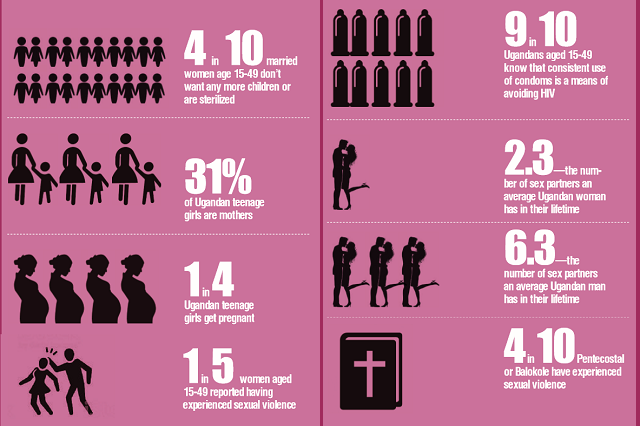
Cheating men and women do not use condoms
Overall, 21% of women age 15-49 who reported having had two or more partners in the past 12 months said they had used a condom during their last sexual intercourse. The remaining 79% said they had not used condoms.
On the other hand, 22% of men age 15-49 who reported that they had two or more partners in the past 12 months said they used a condom during their last sexual intercourse. That means 78% did not use a condom.
HIV/AIDS awareness, knowledge and behaviour
The 2016 UDHS also included a series of questions that addressed respondents’ knowledge of HIV prevention, their awareness of modes of HIV transmission, and behaviours that can prevent the spread of HIV.
Up to 87% of women and 88% of men age 15-49 know that consistent use of condoms is a means of preventing the spread of HIV.
Up to 94% of women and 92% of men also know that limiting sexual intercourse to one faithful and uninfected partner can reduce the chances of contracting HIV. However, more women (84%) prefer to backup faithfulness with condom use. Only 83% of men think that improves chances of preventing HIV.
But the knowledge varies significantly across sub regions. In Bugisu and Karamoja sub-regions, more women (91% and 73%, respectively) than men (65% and 38%, respectively) know that both using condoms and limiting sexual intercourse to one uninfected partner are ways of preventing HIV.
On the other hand, in the West Nile sub-region, more men (87%) than women (62%) know that both using condoms and limiting sexual intercourse to one uninfected partner are means of preventing HIV.
Coverage of HIV testing services
Knowledge of one’s HIV status helps HIV-negative individuals make specific decisions to reduce risk and increase safer sex practices so that they can remain disease free, while among those who are HIV infected, their status allows them to take action to protect their sexual partners, access treatment, and plan for the future.
Based on this background, respondents were asked if they had ever been tested for HIV. If they said that they had, they were asked if they had received the results of their last test and where they had been tested. If they had never been tested, they were asked if they knew a place where they could go to be tested.
The majority of respondents age 15-49 (97% of women and 96% of men) knew of a place where they could get an HIV test. But respondents age 15-19 (89% of women and men) were less likely than those age 20-49 to know a place where they could go to be tested.
Never-married respondents who had never had sex (85% of women and 87% of men) were also less likely than others to know a place to get an HIV test. The knowledge of a place to get an HIV test is lower among men with no education (85%) than men with any education (94-100%).
 The Independent Uganda: You get the Truth we Pay the Price
The Independent Uganda: You get the Truth we Pay the Price



wow!! pretty informative article.I didn’t know that Uganda has that worst situation in sex life.But one thing is positive about having less baby comparing to the number of previous years.
That’s how it is. Diversity in all ways. How is it in your country?